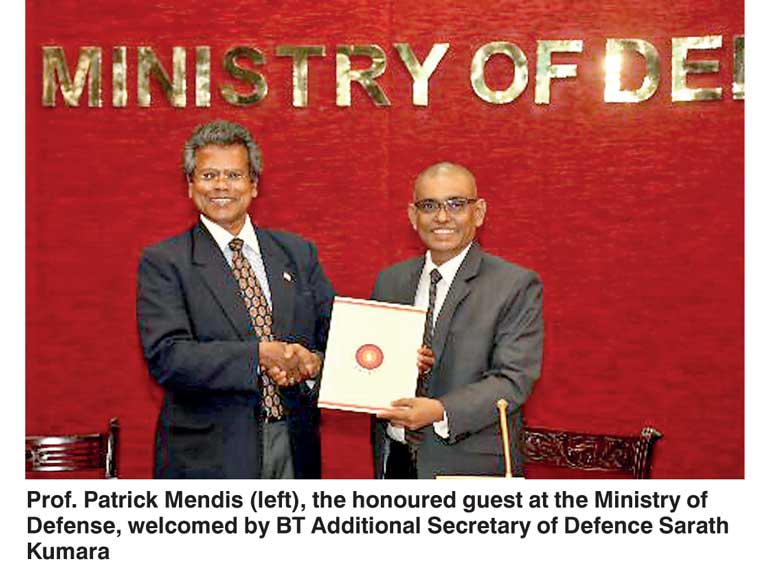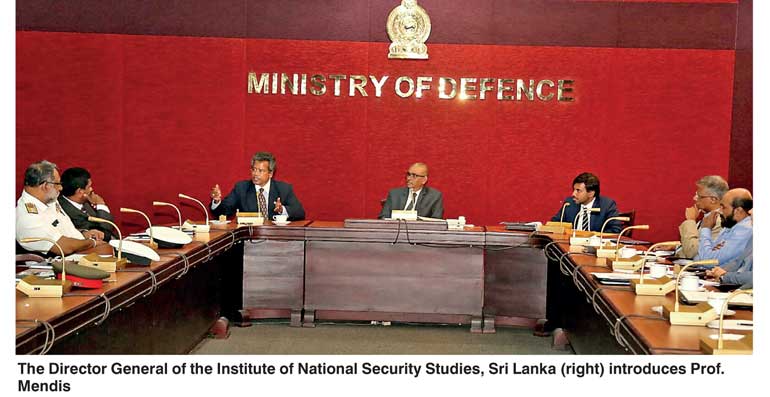Saturday Feb 21, 2026
Saturday Feb 21, 2026
Tuesday, 19 December 2017 00:56 - - {{hitsCtrl.values.hits}}


The Institute of National Security Studies of Sri Lanka organised an intellectually-stimulating ‘Security Salon’ on 11 December at the Ministry of Defence.
The Director General of the Institute, Asanga Abeyagoonasekera, introduced the invited guest Prof. Patrick Mendis, who delivered a lecture on ‘The Lotus Tower and the Indo-Pacific Region’.
Prof. Mendis is an alumnus of the Harvard Kennedy School of Government, the University of Minnesota’s Humphrey School of Public Affairs and the University of Sri Jayewardenepura’s Faculty of Management Studies and Commerce. He is a former American diplomat and a NATO and Pacific Command military professor during the Clinton and Bush administrations, and has been serving as a Commissioner of the US National Commission for UNESCO at the Department of State. The views expressed at the Ministry of Defence are his own and do not represent the institutions of his past or current affiliations.
The discussion was chaired by Additional Secretary of Defence R.M.S. Sarath Kumara and attended by members of the diplomatic community, academic leaders, senior officers of the Army, Navy and Air Force.
Prof. Mendis primarily grounded his presentation on the construction of the $ 104 million Chinese-invested Colombo Lotus Tower, which invoked the Lotus Sutra in Buddhism, and its significance for the Indo-Pacific region and other countries.
Prof. Mendis drew attention to the long-relished commercial and spiritual relations between China and Sri Lanka that have lasted for more than two millennia. Colombo has become a key interlocutor in this Indo-Pacific dialogue as the ‘New Era’ of President Xi Jinping’s Belt and Road Initiative (BRI) gains greater influence in the “Buddhist Kingdom of Lion”, as the celebrated Chinese monk Fa-Hien described the island-nation in the 5th Century.
The BRI and Buddhist legacy are now being signified and manifested by the ‘Peaceful Rise’ of the Lotus Tower. Guiding this relationship for the betterment of the people, however, will prove to be a challenge for Sri Lanka in the future as the debt service on massive Chinese-led projects becomes a reality.
Beijing’s grand strategy is intended to create a new “Pacific” world order, with far-reaching implications not only for Sri Lanka but also for the US and India in the next 99 years, as the two parcels of land in the Colombo Port City and the Hambantota Harbour are leased to China. He believes that such projects can have an impact on national security. However, he is also of the view that with or without the Tower, our communications are already intercepted.
The visiting professor further highlighted that Sri Lanka was at a crossroads in the geopolitical and geo-economic context of the Indo-Pacific region. Prof. Mendis recalled that the White House under the Trump administration has reinvented the concept of the ‘Indo-Pacific region’ to include the Bush administration’s notion of the “arc of democracies” of Australia, Japan, India and South Korea.
According to him, this quadrilateral approach is reportedly designed to prevent China’s rise in the region.
However, China, on the other hand, through its soft loans and smart diplomacy, has managed to build close ties with many of the countries in the Indo-Pacific region.
Prof. Mendis also believes that there is a possibility for Sri Lanka to be a military base for China in the future. In this regard, the greatest challenge for Sri Lanka in the years to come would be how to maintain its current policy of “trade with all, ally with none”.
This concept by Thomas Jefferson, an American founding father and the third US President, is applicable to Sri Lanka as the island deals with China, India, the United States, and other counties as stated by the Harvard scholar.
In essence, Sri Lanka’s “Asia-centric but balanced foreign policy” should be strengthened for future relations with other countries. However, he doubts that the current trajectories will leave room for Sri Lanka to follow that policy, instead leaving no choice but to form an alliance with China.
Prof. Mendis concluded his presentation by stating that if Sri Lanka desired to progress and further develop, it was imperative for policymakers and strategists of the globalising island to gain retrospect through its own history and culture to look for a more peaceful and prosperous future.
A lively discussion followed with a question-and-answer session involving many distinguished members from military, academic and diplomatic circles present in the audience.
Prof. Mendis provided them with his personal perspectives on several other contemporary issues and prognostic analysis of China’s engagement with Sri Lanka.